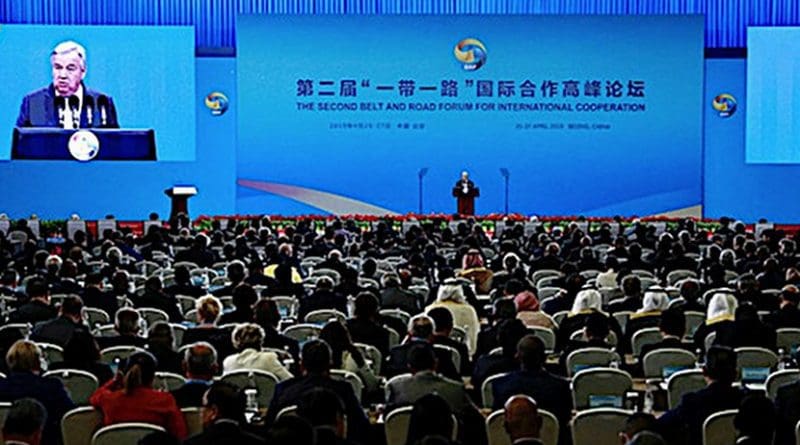UN’s Guterres Expects Belt And Road Initiative To Foster ‘Inclusive, Sustainable And Durable’ Development
By Sean Buchanan
China’s international trade and economic development plan – known as the Belt and Road Initiative – could contribute to a more equitable and prosperous world, and help reverse the negative impact of climate change, according to UN Secretary-General António Guterres.
Addressing Chinese President Xi Jinping and dozens of other state leaders at the Second Belt and Road Forum for International Cooperation in Beijing on April 26, Guterres urged the international community to “come together” in mobilising resources to implement the Sustainable Development Goals (SDGs) and “stop runaway climate change.”
“China’s leadership on climate action is helping to show the way,” said the UN chief, noting the 125 billion investment made by the Chinese government in renewable energy in 2017.
He pledged the support of United Nations country teams – which comprise UN agencies, founds and programmes operating in a country – saying the pillars of the Belt and Road Initiative link to the 17 SDGs, which include ending extreme poverty and hunger, and can translate into “real-life progress for people”.
That means also helping to close the financing gaps for achieving the SDGs, he said, noting the nearly one trillion dollars needed for infrastructure investments in developing countries.
Looking globally, Guterres said that countries today need a way to transition from an “unsustainable, fossil-fuelled grey economy to a clean, green, low-carbon energy future.”
Noting that at least 75 per cent of the infrastructure the world needs by 2050 has yet to be built, Guterres lauded China for its investment in renewable energy job creation and technologies.
“I see the Belt and Road Initiative as an important space where green principles can be reflected in green action,” he told the Forum.
Prior to the meeting, Guterres had noted there was now “a unique opportunity to build a new generation of climate resilient and people-centred cities and transit systems, and energy grids that prioritise low emissions and sustainability.”
According to Guterres, “we must reimagine and rebuild our world in a way that works for everyone, brings women into the leadership of the economy of the future and expands the opportunities for young people.”
Earlier in April, Guterres had sounded a warning about the SDGs, saying that now was a “critical moment” for sustainable development.
“Uneven growth, rising debt levels, possible upticks in financial volatility and heightened global trade tensions” are hampering progress on reaching the SDGs, he told the Forum on Financing for Development at UN headquarters in New York on April 15.
Noting that climate change, greenhouse gas emissions and technologies disrupting labour markets were a major challenge, Guterres said: “We are here today as part of an effort to coordinate an urgent global response to reverse these trends … Simply put, we need more money to implement the Sustainable Development Goals.”
Stressing that development aid remains essential, “especially for the poorest countries”, the UN chief shone a light on the importance of countries themselves generating more funding, including by increasing tax revenue and the impact of investment.
“National policy frameworks are key to reducing risks, creating an enabling business environment, incentivising investment in public goals, and aligning financial systems with long-term sustainable development”, he stated.
Inga Rhonda King, President of the Economic and Social Council (ECOSOC) opened the meeting by highlighting that while progress has been made, “we have not seen the broad transformation that we need, to achieve the SDGs by 2030”.
Pointing to economic and other risks, she homed in on “climate change, from the Caribbean to the Sahel”, which has actively reversed development gains; rising debt levels, which stifle investment in sustainable development; and increasing trade tensions dampening economic growth and inequalities within countries.
To address these risks, King stressed the need to: renew commitments to global multilateral cooperation, align financing frameworks to integrate the 2030 Agenda into national development strategies, and accelerate the financing of sustainable development.
María Fernanda Espinosa, President of the General Assembly, noted that while global economic growth has remained steady, it was not enough just to support the 2030 Agenda.
She underscored the need to generate “600 million new decent jobs” up to 2030, which requires policies to take advantage of public and private SDG funding, mobilise national resources by targeting tax policies, and increase international tax cooperation to deal with tax evasion.
“A sustainable development future requires investing now, in the present”, she maintained. “Now it is time to act, to take decisive steps to make the promise to ‘free the human race from the tyranny of poverty’ a reality and contribute to make our Organisation more relevant for all”.
Delivering a keynote address, Tharman Shanmugaratnam, Deputy Prime Minister of Singapore and Chair of the G20 Eminent Persons Group on Global Financial Governance highlighted the importance of mobilising young people.
Noting that the size of the “youthful bulge” in our populations “vastly exceeds what we’ve seen before”, he said “the largest challenge” was that “we are not prepared to create the jobs required” for them.
We are ill-prepared by “every measure” of education, skills development and ability to provide young people with decent jobs”, he complained.
Shanmugaratnam painted a picture of a failure to create jobs intersecting with other global challenges, such as climate change, loss of the world’s biodiversity and the spread of infectious disease, as having consequences that would surpass just economic costs.

